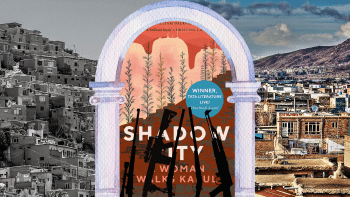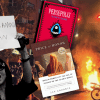Humanity, freedom, and magic realism in the face of authoritarian powers in Iran

On April 1, 1979, after years of tensions between Western and Islamic values, Iran became an Islamic Republic. Theocracy triumphed monarchy and a massive crackdown on "un-Islamic" ways of life swept across the country, suffocating intellectual, cultural, personal, and physical freedom under the weight of a stringent regime.
It is against this backdrop that Shookofeh Azar sets her novel, The Enlightenment of the Greengage Tree—her first to be translated into English. Originally published in 2017, it has been shortlisted for the Man Booker International Prize 2020 and The Stella Prize for fiction in Australia, where she currently lives, having moved as a political refugee in 2011 after being jailed on several occasions for her independent reporting in Iran.
The novel is told from the perspective of a 13-year-old girl. Bahar died in a fire after her family home—a secular and intellectual space—in Tehran is stormed by fanatics. Primarily through her, Shookofeh romanticises death and links it with freedom: "You are suddenly light and free and no longer afraid of death, sickness, judgment or religion." Bahar's ghost narrates the story and is omnipresent throughout her family's turbulent life. After the revolution, they move to Razan, a remote village in northern Iran where there are scarce signs of civilisation.
The village is so disconnected from the capital and other regions that it only comes to know about the revolution years later. There, amid groves, ancient temples, Zoroastrian remains, a sprawling forest, folklore, and spirits, the family build their life anew. This newfound tranquillity is soon disturbed when their only son Sohrab is arrested and later executed by the regime on flimsy grounds. He is one among the many hanged and buried in unnamed mass graves filled with political prisoners. Through Sohrab, the reader comes to understand the horrors—like swallowing fallen plaster out of hunger—of imprisonment without access to basic amenities. Particularly striking is Azar's haunting portrayal of his days in solitary confinement, no doubt inspired by her own experience with it while she was still living in Iran.
The narrator is a bridge between two different worlds in this book, and often, it feels as though despite her death, she is very much alive in a transcendent state. She engages in regular conversations with her father, Mum, and Beeta, her youngest sibling. She is always hovering over them as a guardian in charge of protection. Yet away from the mortal realm, she also interacts with other spirits who become some pivotal characters in their own rights and add significantly to the novel's intellectual depth.
Case in point is one Siberian hunter's ghost, who was killed by a bear thousands of years ago. After narrating the tragedy that wrecked his life, he says, "If every one of these wandering ghosts wanted to avenge themselves on another ghost or person, the world would become hell." Besides these spirits, forest djinns also populate the story. Djinns who bless, curse, and wreak havoc in villagers' lives. Djinns who are repulsed by iron, who are heavily territorial and deferential to the laws of nature. Azar uses them as tools of ecological justice. Take, for instance, the man "skinned by twelve forest djinns", his flesh and bones ripped from his body. His offense: the killing of a pregnant tiger roaming in the forest of Razan.
Similarly, it is justice that Shokoofeh Azar seeks when she deploys magical realism to punish an authoritarian leader under whose regime the protagonist's family, among thousands of others, suffer. The leader (Ayatullah Khomeini) and his guards are haunted by the shrill cries of those executed. The ghosts' tears pour from the sky and reach the steps of Khomeini's bedroom, staking claim over his sanity. He even soils himself at one point. Shookofeh thus blends fiction with history and punishes a leader by forcing him to reveal his basest human functions for readers with witness.
The novel is packed with such irresistible parables and tragic stories of separation and hardship caused by authoritarianism. From the burning of "problematic books" to the monitoring of intellectual growth and culture, Azar's pages radiate what it means to be living in a state that coerces its citizens. "Animal Farm was burning: the cows, donkeys, pigs, dogs and horses braying and squealing; the odor of their roasting flesh filling all of Razan. But the Mullah and his three companions felt nothing," she writes in an especially moving scene. The story revolves around such realities, covering extremism, sexual violence, and environmental degradation.
The only trouble with the book is that the ending—despite being beautiful—feels overstretched. Still, The Enlightenment of the Greengage Tree is a novel relevant to our times and a compelling read, not only because of gut-wrenching exploration of human nature and history, but also the extraordinary surrealism with which it pulsates.
Shah Tazrian Ashrafi is a contributor to Daily Star Books.

 For all latest news, follow The Daily Star's Google News channel.
For all latest news, follow The Daily Star's Google News channel. 











Comments